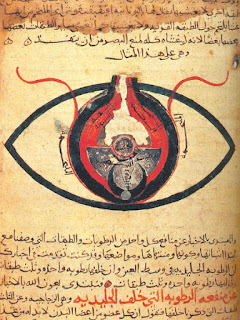Although there are no eyewitness accounts of the Fatimid navy attacking Genoa, it was a well-known event to both Christian and Muslim writers not long after. Bishop Liudprand of Cremona (c.920 - 972), writing in 960CE (samples of his chronicling were mentioned here and here), wrote about the Muslims first attacking the city of Acqui, not far from Genoa, and then says:
At the same time, in the Genoese city, which has been built in the Cottian Alps, overlooking the African sea, eighty miles distant from Pavia, a spring flowed most copiously with blood, clearly suggesting to all a coming calamity. Indeed, in the same year, the Phoenicians [North Africans] arrived there with a multitude of fleets, and while the citizens were unaware, they entered the city, killing all except women and children. Then, placing all the treasures of the city and the churches of God in their ships, they returned to Africa.
Liudprand mentions, among the treasures taken away from Genoa, linen and silk. This would have been too early for the West to be developing silk production, and so it suggests that Genoa was prosperous enough to be trading in such valuable materials with the East.
The first Arabic source is from even later, and names the caliph who ordered the attack. Other Arabic sources get very specific in details, although they don't always agree on things like the number of ships (20 or 30). As they approached, the Muslim ships encountered merchant ships, attacking and appropriating their goods and taking prisoners.
Genoa is described here as a well-fortified city, and although other cities would have been attacked, Genoa is the only one named. Unlike Liudprand's report, the Arabic source says the Genoese fought outside the city walls and then on the streets. The city was plundered and burned on 16 August 935. Because of the medieval tendency to exaggerate, we have to consider carefully whether we believe the report of 8000 prisoners taken, including 1000 women sold into slavery.
The fact that Genoese records don't exist in any large numbers before the second half of the 10th century gives further evidence that there was destruction prior to that. The author of the Golden Legend, Jacobus de Voragine, writing 300 years later, claims the attack was successful because the Genoese fleet was away at the time, but they pursued the Fatimid fleet and rescued the captives. (Not very likely, Jacob.)
Genoa slowly recovered, however, and we'll look at its rise to commercial powerhouse starting tomorrow.






